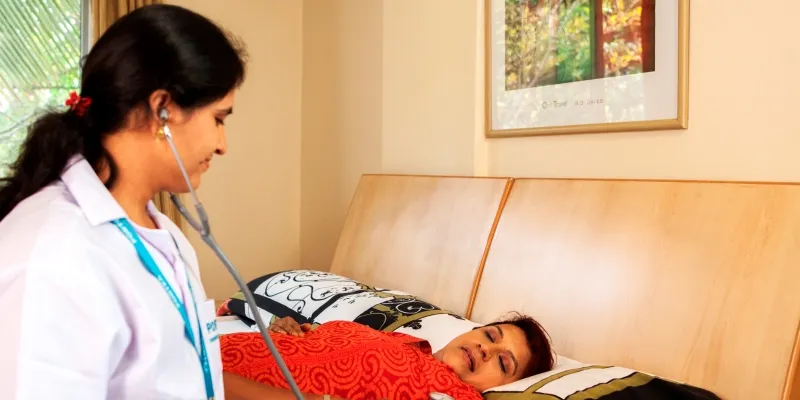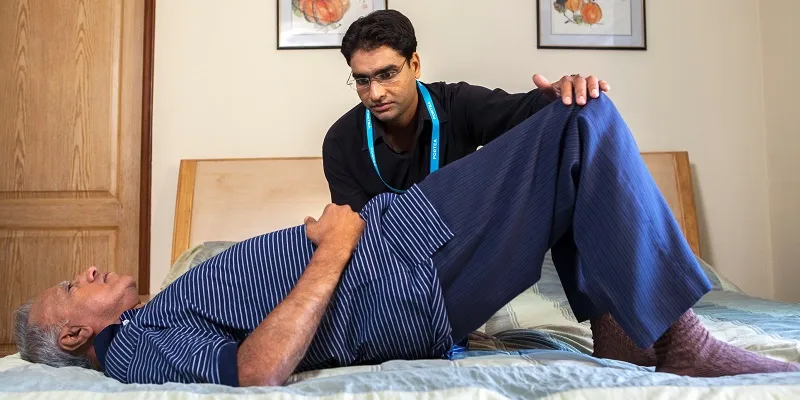Portea brings convenience in healthcare for home-bound patients and their families
Many stories of pain, suffering, neglect and haphazard care are hidden inside countless homes where a family member is a patient of a chronic disease.
With nuclear families and working couples fast becoming the norm, especially in urban areas, taking good care of a sick family member at home has become a challenge. The choices have been fairly limited – either a family member has to take on the entire responsibility, or look for hired help or a resident nurse. And getting qualified and reliable help has never been easy.
It’s exactly what K Ganesh and Meena Ganesh experienced when a close family member was diagnosed with cancer. For the two serial entrepreneurs and investors, it drove home the fact that there were many challenges in getting quality home-based care in India. At the time, the husband-wife duo had just successfully exited their previous venture, TutorVista, and were exploring other opportunities.
"We found that the lack of affordable and quality home healthcare in India was a big pain-point and provided a large ‘whitespace’ opportunity that we felt we could address," says Meena, who along with her husband, co-founded Portea in 2013.

Growth beyond numbers
The journey began in June 2013 from a small office in Bengaluru, a skeletal team and less than 50 customers across Bengaluru and Delhi NCR. Today, Portea has a team of over 3,500, operations across India and Malaysia, and clocks over 60,000 visits to patients’ homes each month.
In the past year, Portea claims to have seen revenue grow by about 200 per cent, the number of home visits increase by 151 per cent, the number of active patients rise by 91 per cent, its patient database expand by 307 per cent, and its clinicians base grow by 255 per cent to 2,300. The company declined to share current and targeted revenue.
Portea also received $46.5 million in funding across two rounds from marquee investors like Accel Partners, International Finance Corporation (IFC), a member of the World Bank Group, Qualcomm Ventures and Ventureast. It also recently acquired specialty pharmaceutical distributor Medybiz Pharma to strengthen patient engagement and provide better care for patients of chronic diseases in India.
"Our belief is that our impact goes beyond figures; we have created an industry where none existed, bringing visibility and credibility to the home healthcare sector in India and to the concept of ‘consumer healthcare," adds Meena.
Before Portea’s services became available, a family needed to go to several doctors, quite possibly in different locations, to address age-specific healthcare needs, not to mention things like basic primary care, post-operative care, routine check-ups as well as allied needs like diagnostics, medical equipment or specialty medicines. And it’s not always elders who need such services. Think of someone recovering from an accident or a sports injury who needs not just physiotherapy but help in getting around the house.
What we have now created is a framework in which Portea is a co-participant and fully invested in the entire family’s healthcare needs," says Meena. The company offers a full suite of services from at-home care and medical equipment on rent to lab tests and consultations with doctors.
Bringing tech to healthcare
"We have also created entirely new solutions using technology, including remote diagnostics," adds Meena. Portea also uses tech to manage a remote workforce, standardise processes and seamlessly integrate the offering for patients by providing them with a consolidated view of everything.
Portea has started using point-of-care devices and remote monitoring equipment at patients’ homes. When Portea clinicians visit a patient, they use diagnostic tools that capture patient data, which is uploaded through smartphones to an EMR platform. This platform then uses predictive analytics to analyse health trends and take steps like getting a doctor to monitor the patient regularly if the trend indicates that the patient’s health is deteriorating.
The backend algorithm provides alerts if a patient’s vitals cross internally set thresholds and also checks for adverse drug reactions to any new drugs prescribed (against the patient’s existing drug prescription).
Portea’s patients receive medical oversight in coordination with their specialists. This is divided into three layers. The work of the clinicians is overseen by subject matter experts who are, in turn, supervised by Portea’s Medical Director. The team at Portea also works closely with consulting specialists and doctors of the patients.

Challenges
The key challenge when Portea started was to create awareness about home healthcare.
"Building a consumer brand is tough in any field; more so in a sector like healthcare, which is a very personal and emotive issue; doing all of this at-scale, while maintaining quality and affordable prices, is a considerable challenge," adds Meena.
The team not only used traditional means of spreading the word like print, radio and outdoor campaigns, but also organized camps at apartment complexes and corporate offices. Building a strong team for the diverse roles that are a part of Portea’s structure was also important.

"There is huge diversity in the profile of people that make up this industry; while some of our employees come from premier B-schools and engineering campuses, we also utilise the talents of rural and semi-urban men and women who are recruited, trained and offered jobs as Nursing Attendants at Portea," says Meena.
The nursing attendants are selected and sent to Portea by the National Skill Development Organisation. After a basic interview, the candidates are trained on etiquette, hygiene, behaviour and customer care.
Considering the sector Portea operates in, it is important to keep the patient’s needs at the centre of everything.
"We understand that Portea’s patients and their families come to us in their time of need. The onus is on “owning” patient outcomes and not just on “treating” patients,"explains Meena.
For many of Portea’s customers, their services are a necessity. Pandurang Pai and his wife are a case in point. "Both my sons are in the US. They were obviously worried about us since we are alone, but from the time we contacted Portea, things are much better. The nurse from Portea not only gives us the right advice and checks whether we are taking our medicine, but also spends some time and we love to speak to her," says Panduranga, 80, a resident of Malleshwaram in Bengaluru.
Opportunity
We need to only look around us and within our families to realise the opportunity in home healthcare. India’s healthcare infrastructure is still rickety at best. Already, non-communicable diseases like cancer, hypertension and diabetes account for 51 per cent of old-age deaths in India, according to Global Age Watch.
Add to this the fact that 20 per cent of Indians, according to Global Age Watch, by 2050 will be over 60 years old by 2050, and the need for home healthcare becomes a significant one.
All these data points, along with social trends like a rising number of double-income households, clearly show that home healthcare will very soon become a vital necessity in India. Portea, along with competitors like India Home Healthcare, Unique Home Care by Apollo, Healers and Home and Nightingale's, can create and capture a large market if they get their patient care model right while scaling up.







